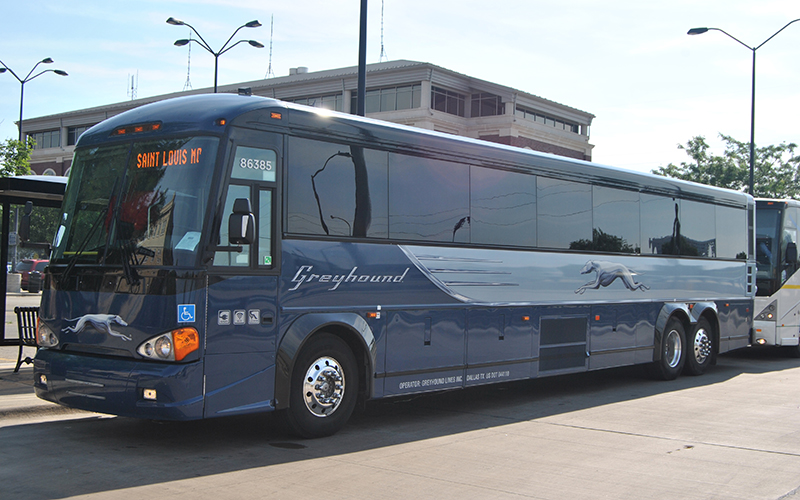
The American Civil Liberties Union has written to Greyhound Lines Inc. complaining that the company is allowing Border Patrol agents to conduct warrantless searches of passengers of color. (Photo by Loco Steve via Creative Commons)
PHOENIX – Greyhound bus passengers of color, who speak with accents or simply are “not white,” routinely are questioned and sometimes detained by Customs and Border Protection agents, according to the American Civil Liberties Union.
On March 21, ACLU affiliates, including Arizona’s, delivered a letter to Greyhound Lines Inc. addressing what the group deems “warrantless searches.”
Billy Peard, a bilingual staff attorney for ACLU of Arizona, said the letter resulted from a number of incidents, including some in metro Phoenix.
“We’ve received enough complaints recounting very consistent stories that allow us to draw a pretty broad conclusion that this is happening in a systematic manner,” he said. “This is not an occasional occurrence.”
Greyhound has been communicating with the ACLU and discussions are ongoing, Peard said, but the outcome is unclear.
“I’ve never worked with Greyhound before. I don’t think the ACLU has negotiated or worked with Greyhound, so we don’t know what their approach will be,” he said. “We hope that they will come to the same conclusion that we’ve come to, which is essentially that Greyhound is under no legal obligation to allow Border Patrol onto their buses.”
Ray A. Ybarra Maldonado, a criminal justice and immigration attorney, agreed that Greyhound isn’t required to allow federal authorities on company vehicles to interrogate passengers.
“Greyhound could, in theory, when they get pulled over by Border Patrol agents or someone from Customs and Border Protection, not open the door to allow the officer in, unless the officer has a warrant signed by a judge that the judge says ‘I give you permission to enter into this vehicle to check for,’ whatever they’re checking for,” Maldonado said.
“It’s not saying, ‘We’re not going to comply with you, we’re not going to work with you.’ It’s just saying, ‘We’re going to comply with the constitutional rights of our passengers, and if you want to come and talk to them, then you have to go to a judge who will decide whether or not you can come on our bus.'”
The constitutional rights Maldonado mentioned are those under the Fourth Amendment, which protects against unreasonable search and seizures and is the basis for laws governing search warrants. CPB’s unwarranted searches on Greyhound buses violate those rights, Maldonado said.
“I think the argument is the Fourth Amendment protects individuals from warrantless searches,” he said, “and once someone buys a ticket and is in a non-public area of the bus, Greyhound would not be legally obligated to allow officials onto the bus to question those passengers. We’re seeing a conflict between individual rights and the militarization of the border.”
Maldonado said the issue is confusing because the general public is under the impression that Border Patrol has unfettered rights to do whatever they want, whenever they want.
In cases where federal authorities board a bus for questioning, Maldonado advises passengers to not disclose personal details.
“It’s always in the person’s best interest to give as little information as possible to federal agents when they don’t have a warrant,” he said. “If they don’t have a warrant to come on board, then there’s no need. It should be considered a consensual encounter where you don’t have to keep talking to anybody, you don’t have to turn over any documents, and if you’re not detained, you should be free to leave.”
Peard, with the ACLU, said Greyhound isn’t ensuring the well-being of its passengers.
“Greyhound has a very specific client base,” he said. “A large number of their clients are very vulnerable in different ways. And the corporate headquarters, as I can tell, is not taking steps to recognize and protect their own customer base, who oftentimes are vulnerable, have mixed immigration statuses, or are simply trying to get from one part of the country to another.”
A private company as large as Greyhound would be expected to have the utmost, sound legal advice, Peard said.
“Either they’re receiving poor legal advice from their attorneys, which is concerning, or they’re receiving accurate legal advice from their attorneys and they, nevertheless, have made the conscience decision to subject their customers, their passengers, their paying customers to unwarranted harassments and risk of deportation, when that could be avoidable,” he said.
“Their job is to get their customers from point A to point B. Their job is not to collaborate with law enforcement to any extent beyond what they’re legally obligated to do.”
Cronkite News has reached out repeatedly to Greyhound for comment, but the company so far, has not responded.